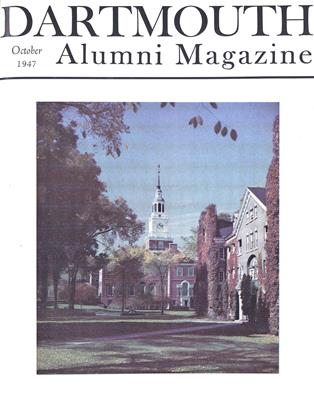Exploring Great Issues
In establishing its course on "Great Issues," Dartmouth College has set an interesting and useful pattern. Convinced that the liberal arts college must assume responsibility in training its men and women for community leadership, the college this fall will require all its seniors to attend three sessions weekly on the significant issues facing the world. Guest lecturers, leaders in their field, will come to the Dartmouth campus to give the students the benefit of their own wisdom and experience.
Developed by President John Dickey, the Dartmouth plan shows a refreshing approach to the college curriculum. Here is imagination and vision blended with everyday realism. The students at Dartmouth will learn how to read and evaluate a newspaper; in fact, the newspaper is to be a basic part of the Great Issues course. Each senior will be required to subscribe to a metropolitan daily, and then follow the news from day to day. The college officials are confident that at the end of the experimental period the course will become a permanent and substantial part of the curriculum. It is entirely likely that by the end of the three-year period the project will be transplanted in some degree to campuses in various parts of the country.
The idea behind the project is excellent. As the course points out, the students will become concerned with the urgent issues that confront mankind today in the search for a just peace, the building of a sound economic order "and the search for moral and ethical values which will enable our culture to survive." That is a worthwhile objective for Dartmouth or for any American college or university.
Dartmouth's "Great Issues"
An analysis of contemporary problems will be a required course this fall for every Dartmouth senior. It will be known as the "Great Issues"—"G.l." for short—and any resemblance to the "Great Books" of other institutions is purely coincidental. The textbook will be the morning newspaper and the laboratory will be in the library, where periodicals, books, documents and material of all kinds bearing on current national and international issues will be on exhibit.
Two years ago, when John Sloan Dickey took over from Ernest Martin Hopkins as Overlord of the Hanover Hills, he found the Dartmouth faculty, in common with colleagues up and down the land, deep in reappraisal of the higher learning. To the search for a greater measure of coherence in the curriculum, war time had provided both an occasion and a stimulus. Columbia had led the way in a broad program for the two underclass years. At Yale the pendulum had swung back from too great freedom in electives, and at Harvard a plan for general education, running vertically through all four years, had been formulated. At Princeton the trend toward an earlier concentration in one field threatened to leave little of the old insouciance in sophomore year.
To Dartmouth the relative maturity of the senior year and the desirability of a "heightened sense of public responsibility" were important considerations. A course in the great issues of the day, which would utilize what had been learned in the first three years, would also serve as a bridge to active citizenship and to adult self-education. A course taken by every senior, without exception, would be an intellectual experience in common, and there would be collateral values in terms of class unity and mutual understanding. Dr. Dickey insists that the project is experimental and that too much should not be expected of it. It seems reasonable to expect a good deal, even in the first year.
 View Full Issue
View Full Issue
More From This Issue
-
 Article
Article"Enter ye in by the Narrow Gate ..."
October 1947 By ALBERT I. DICKERSON '30, -
 Article
ArticleTHE GREAT ISSUES COURSE
October 1947 By THOMAS W. BRAD EN '40 -
 Class Notes
Class Notes1918
October 1947 By ERNEST H. EARLEY, DONALD L. BARR -
 Class Notes
Class Notes1915
October 1947 By SIDNEY C. CRAWFORD, CHANDLER H. FOSTER -
 Class Notes
Class Notes1913
October 1947 By WARDE WILKINS, ROBERT O. CONANT -
 Class Notes
Class Notes1943
October 1947 By FRED F. STOCK WELL, WILLIAM T. MAECK
Lettter from the Editor
-
 Lettter from the Editor
Lettter from the EditorEditorial Comment
JUNE, 1928 -
 Lettter from the Editor
Lettter from the EditorEditorial Comment
June 1929 -
 Lettter from the Editor
Lettter from the EditorEditorial Comment
JANUARY 1932 -
 Lettter from the Editor
Lettter from the EditorDartmouth Sea Dogs
March 1940 -
 Lettter from the Editor
Lettter from the EditorLetters
June 1945 -
 Lettter from the Editor
Lettter from the EditorWhat's a Humane Letter?
February 1939 By JOHN PALMER GAVIT

